Sviatlana Tsikhanouskaya: This Campaign Taught Me One Thing - Not To Give Up
39- 25.06.2020, 13:37
- 118,288
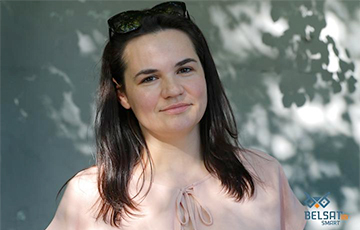
PHOTO: BELSAT
Sviatlana Tsikhanouskaya has come as the biggest surprise of the presidential election campaign in Belarus.
The biggest surprise of the presidential election campaign in Belarus was Sviatlana Tsikhanouskaya. In fact, her husband, the popular video blogger Siarhei Tsikhanouski, was nominated as presidential candidate. But on the days of the registration of initiative groups, he was jailed for 15 days in a very timely manner, and his group was not registered, despite the power of attorney Sviatlana had. And here she made a move unexpected for everyone: she registered the group as her own. After leaving prison, Siarhei Tsikhanouski learned that he was not a presidential candidate at all, but the head of the initiative group of his wife. However, he was in that capacity for only ten days, after which he was arrested right at the picket to collect signatures. Now Siarhei is held in the remand prison on charges of “organizing actions that grossly violate public order”, and Sviatlana has handed over 110 thousand signatures to the CEC.
On one of the last days, she almost stopped the whole campaign after a call with threats to her children. But still she withstood. The Tsikhanouskis have two children - four and ten years old. Now they are drawing and stacking the drawings in envelopes to send them to dad “on a business trip”. And Sviatlana continues the struggle - both for the release of her husband, and for the release of everyone else.
Novaya gazeta journalist Iryna Khalip spoke with Sviatlana Tsikhanouskaya:
— Sviatlana, you have engaged in a battle like a brave and reckless soldier. What was the most difficult for you during this month, when the collection of signatures was underway?
— The most difficult thing for me was the constant expectation that something is about to happen. Searches began, people were arrested in the streets, Siarhei was jailed - and I constantly thought that now they would also take me somewhere in the street, and I had children at home, and what would happen to them, and how my parents would survive it. I was feeling danger all the time.
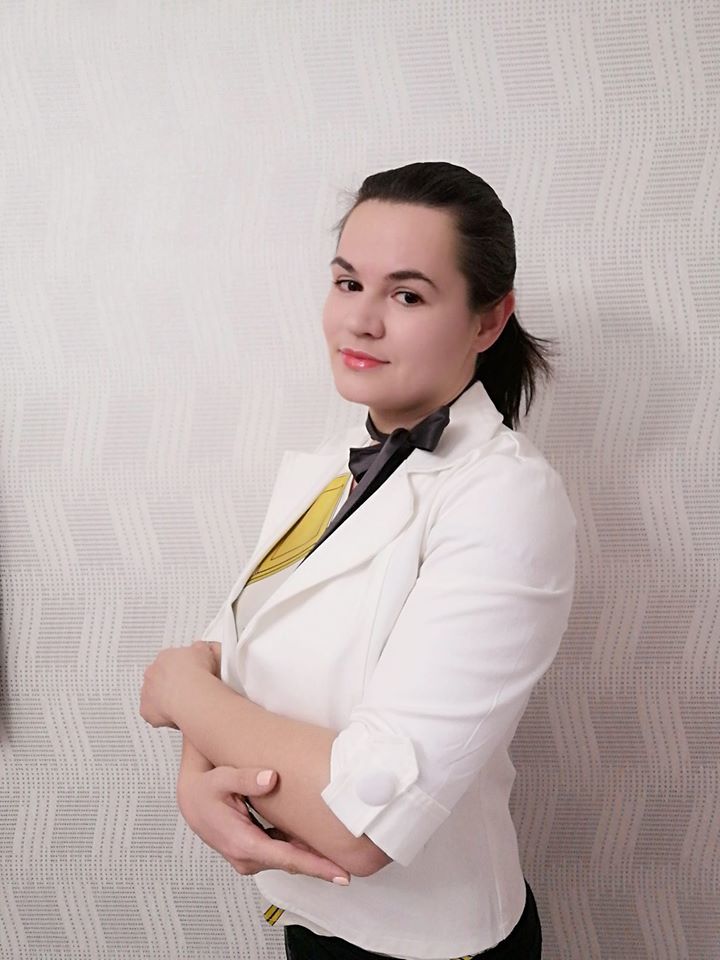
PHOTO: FACEBOOK
Of course, I was worried about Siarhei, and for those who were detained with him, and for members of the initiative group who were subjected to pressure, and for the people who appeared in Siarhei's streams. But most of all I was afraid for the children. I could not leave the apartment unattended. The apartment is on alarm, and the police have the keys. So, someone should be at home all the time. So, if I am not at home, my mother and children will not be able to walk outside, especially after the searches in the country house when two investigatory brigades did not find anything, and the third with a gesture of a magician pulled out 900 thousand dollars from behind the couch.
I recalled that when Siarhei was abducted, he had with him a backpack with the keys to both the country house and the city apartment, which means they could use them anytime. For four nights in a row I couldn’t make myself fall asleep. And this expectation of something nasty to happen soon is very exhausting.
— When you cancelled your pickets on the last weekend before the expiration of the signature collection campaign term, did anyone warn you about the preparing of provocations?
— Everyone thinks that we have a headquarters here, some people, but in fact, everything is different. Then I came home — I remember it was on Thursday, June 11 - and my heart was all uneasy, something was bad. I recalled how someone had photographed a bag of stones last weekend, near the pickets in the Kamarouski market. Maybe this bag happened to be there by chance, but I couldn’t get it out of my head. And next to that bag were those agents in civilian clothes.
And I thought that just one stone thrown into the crowd is enough to spill blood. And then I recorded a video message to my initiative group, and really hoped that they would hear me, and no one would go anywhere. This, of course, was a rash step: we have a small initiative group, and that weekend was very important for collecting signatures.
But I believe that not a single signature is worth it for people to take such risks.
It was only my decision — I just felt something.
— You just thought about the bag of stones, and canceled the pickets? Many think though that you have a huge electoral HQ, with experienced political strategist and PR specialists, who advise you what to do.
— Oh, you should have seen how our campaign went! In fact, it was some kitchen-table effort. When they took Siarhei, I didn’t understand what was going on. It seemed to me that I fulfilled my mission: I helped my husband, registered an initiative group - and stepped aside. Politics is not mine.
But when he was taken away, I realized that now, in any case, I am in charge. I began to delve into everything, and at the same time I had to deal with other issues: find out where Siarhei was, look for lawyers, pack the parcels. And the process of collecting signatures was left to chance. At least a week after Siarhei’s arrest, people somehow organized themselves.
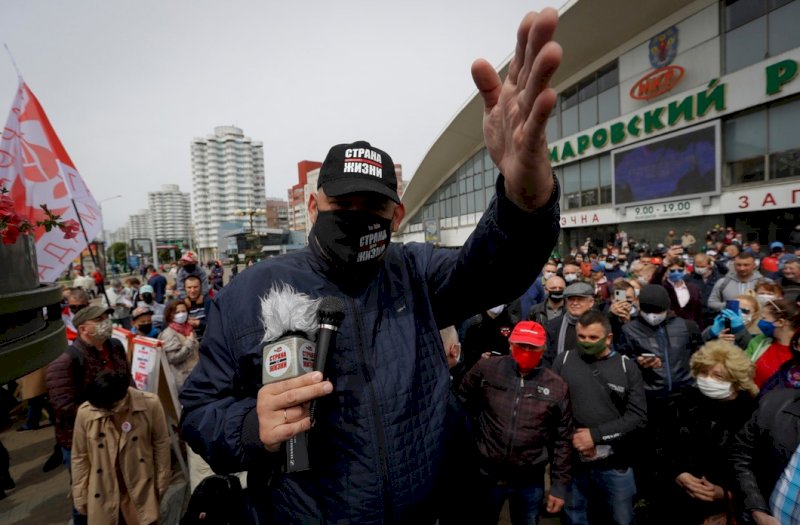
It was later that I began to read chat messages, to understand how it all works. I did not know a single person from my initiative group. And people with bare enthusiasm collected signatures, printed out signature sheets, provided pickets with tables and tents, brought food to those who sit at the pickets all day, rendered moral support. The people really felt some kind of unity, I saw it. And then I slowly began to delve into everything.
Of course, I’m not a politician, and many gentlemen and ladies laugh and say, like, where do you think you are going to?
But I never claimed to be a politician! I’m just a loving wife who made a mistake or a feat. And at that moment when I decided to do this, I did not know how everything would turn out.
Just went to the embrasure for my husband.
— Did you really decide in just one second: “Well, if they refuse to register my husband, then I will register myself?” Or maybe you were thinking, analyzing, considering options, talked with your loved ones?
— This was an impulse. An absolutely one-moment impulse. I can tell you the full chronicle of that day. In the morning, I was at the CEC session, where they refused to register Siarhei. So I came homer and I couldn’t even play with my kids, as all I could think about was my husband. How he was, how I could help him, what to do, he is bad there.
And suddenly I realized: stop, he has an initiative group, I only have to submit a relevant application, so let me take away his group and register it. Maybe I can help him this way.
I was almost sure they would not register me, it was an impulse, like, my dear husband, I did everything I could. In fact, it was possible to stop there: unregistered, so what. And move on. But I had to do everything possible to feel peace.
— I believe the moment of unexpectedness played its role in your being registered in the end. They didn’t register Tsikhanouski, okay. But then his wife suddenly appears with the same list of an initiative group, claiming it was her dream since childhood.
— I don’t think it was unexpectedness. I think they registered the initiative group just to make fun of me, like, let’s see who will go signing for you.
— Could you imagine back then that the people will line up in kilometer-length queues to sign for you?
— I understand perfectly well that this is not about me. These people came to Siarhei, not to me. I was just his representative. There were many people who came and said “I wanted to sign for Tsikhanouski, but I will not sign for Tsikhanouskaya”... They probably didn’t get the whole situation. Because those thousands of people who stood in the queue actually signed for the ideas expressed by Siarhei Tsikhanouski.
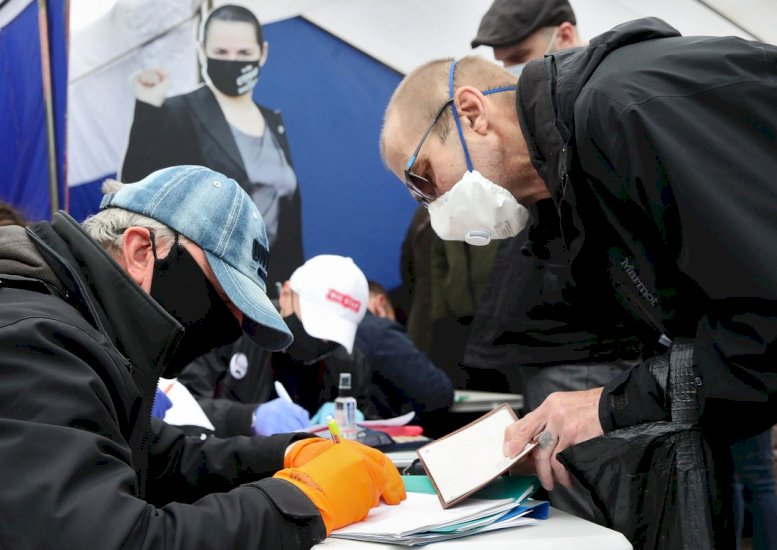
He has done tremendous work over the past year, made many people look at themselves differently: I am a person, I am a citizen, I have the right to be heard. And of course, these signatures were for Siarhei. And then I heard a lot of kind words addressed to me. People said that they came precisely thanks to my act: if in this family everyone protects each other, then there is a chance that in the country everyone will stand for each other in the same way.
And they said to me: you belittle your role, if not for your act, we would not be able to demonstrate our support to Siarhei at all. I now understand that, of course, I played a certain role, but this is a drop in the bucket.
— You have played a huge role in the actual fact. In many aspects, those multi-kilometer queues were your merit. Even if they were not going to — here’s such a story, a pure Hollywood movie! Besides, what was Siarhei’s reaction when he went out of jail and found himself the head of his wife’s initiative group?
— He didn’t know anything. He sent a letter of the CEC from the detention center, and was sure they had registered him. His first reaction was “why did you get into this?” He knew I was absolutely apolitical. He could not understand this act at all. But later on, closer to the evening, he got the whole situation. He said he didn’t expect me acting like this, he is very grateful and proud of me. He couldn’t believe I did it. I can’t believe it either.
— Do you mean you didn’t participate in anything the first ten days of the signature collecting campaign, before Siarhei’s arrest?
— I only helped to deliver the IDs of the initiative group members to the people. And relaxed: everything is good, my husband is free, my heart pacified, I was doing stuff with my kids. Until May 29.
— Did Siarhei expect he might be arrested?
— You know, at that moment I still did not know anything, and someone explained to me that while the collection of signatures is ongoing, the pickets are legal and the actions of the members of the initiative group are legal, and in general the initiative group is safe. And I thought that Siarhei would do everything at these pickets that he had done for his blog: asking people, writing down their answers — and all this would be at a legal event. The provocation, allegedly with an attack on a policeman, of course, turned out to be rude and unprofessional.
Fortunately, thanks to streams and cameras, everyone saw everything. But then it was just a reason to detain him. And then, when they began to press charges, it was unexpected. The first accusation fell to dust, the record shows that Siarhei is too far from that policeman. And now he is accused of organizing actions that grossly violate public order. I think that for Siarhei this was also a surprise.
— Do you get letters from Siarhei?
— I got only one letter. Siarhei wrote it on June 3, but I received it only on June 18. We sent him letters, and the kids’ drawings “to dad on a business trip”, but I don’t think they passed all this to him.
— How did you two meet? He has such a powerful, persistent manner of communication with people, that I think he might come over to you and said “I’ve decided everything, you should be my wife.” How did it happen in the reality?
— In fact, this is how it probably was from his side. I studied in Mazyr, at the pedagogical institute, and Siarhei was the director of the club, to which my friends and I once came. That was Monday. I did not know that he was the director of the club - I always treated such people very carefully, tried to avoid the “masters of life”. I am a modest person and always tried to communicate with modest people.
Siarhei immediately gave us invitations to the club on Saturday (and we, poor students, could not afford to come on Saturday), but already on Tuesday, the next day, somehow found my phone number and invited me on a date. And then, when we recalled this, he said: “I fell in love instantly.”
Strong, confident, charismatic - he immediately turned me around in his incredible energy. It impressed me, and I fell into this whirlpool. A year later we got married.
— A year ago, when Siarhei gave up his business and started a video blog, did you try to persuade him to return things as they were, and leave peacefully in prosperity?
— Of course, I did not immediately understand and accept it. And at first it was not a political blog. Siarhei did not intend to ridicule the state power. He rather laughed about local peculiarities: well, remember, for example, how a public toilet for a million dollars was built in Homel, but it does not work?
In general, Siarhei was inspired by the purchase of a dilapidated house in a village in the Dobrush region to create his YouTube channel. He wanted to restore the house, open an agricultural estate, rent a lake so that visitors could relax and fish. He had big plans.
We thought that the state should only be glad that someone is ready to invest money, restore houses, develop agrotourism, and return life to the villages.
But it turned out that everything was not so simple.
Two years after the purchase, Siarhei could not even take ownership of this house. To patch the leaking roof, you need permission. One wall was destroyed, and in order to restore it, a new architectural project was needed, which should be approved in a dozen instances.
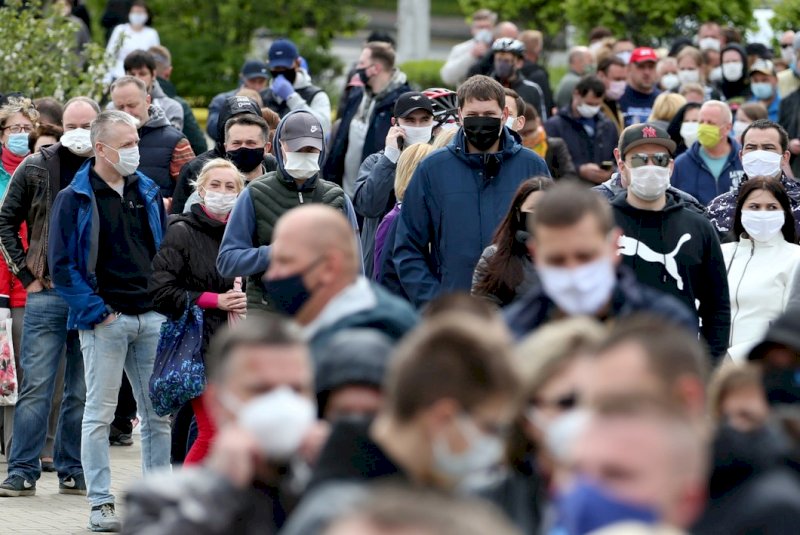
In general, for two years, instead of restoring and repairing, he sat in the reception rooms of local officials to get the necessary information. And the officials, instead of saying thanks to the person, just tried to pull money out of him. So the impetus for starting a video blog was a personal story.
And then Siarhei began to invite people to talk about how they live. Then he began to travel around the country— and so it all gained momentum.
The blog was politicized as Siarhei interacted with people and realized how poorly they live. He just showed our reality. And until the moment he was detained for the first time and put in a temporary detention center, I generally thought that he would play with YouTube for some time and calm down.
I know Siarhei: if he is carried away by some new occupation, then he devotes himself to it to completely. And when he was arrested for the first time for 15 days, I realized that this was serious. Perhaps it was a signal to stop. But Siarhei is not one of those who can be stopped by threats. He began to look differently at his homeland, at the people who live in our country. He rented a motorhome and started driving it around Belarus. People helped him a lot — with their help, he was able to buy good equipment for the shooting. He wanted the blog to be of high quality.
— When the third by number investigatory brigade pulled $ 900 K from behind the couch in your country-house, the reaction of the people was predictable for you and me, but unpredictable for the law-enforcers: nobody believed them. Usually, such tricks are supposed to distract the public opinion from repression and to make people discuss what money it was and where it was aimed at. Here, there was absolutely no sensation. The law-enforcers probably lost connection with the reality.
— You know, I haven’t come across their methods before. They are rather awkward. And this detention with a provocation, and this huge money behind the couch. The people have already started making jokes about all this, like “After the fifth search they found the second sock behind Tsikahnouski’s couch”. Or “(after the search at the place of another arrested presidential hopeful, Viktar Babaryka) “During the search in Babaryka’s house, they found a couch behind the money.”
— Sviatlana, does it irritate you when they compare Siarhei with Aliaksandr Lukashenka of 1994?
— I was only recently told about this for the first time. Personally, I have never drawn such parallels. Perhaps because of my age, I don’t remember what Lukashenka was like when he was young. But I can compare Siarhei with the Lukashenka of now. What can I say ... Maybe power leaves its mark? But I do not see anything in common.
Lukashenka is overflowed with power to the brim, his face says “I will not give it to anyone”.
And in his youth — who knows — maybe he really wanted to change something in the country for the better, but could not pass the test of power? And in Siarhei, I see a sincere desire to help people. He does not need power. He empathizes with people, he traveled around the country and saw this devastation, these collective farms that were no longer needed. He was physically ill when he saw how many people live in our country.
— The longest queues to your pickets — maybe it was the response of Belarusians to his empathy?
— It's just that no one asks people for a long time how they live. No one is interested in them. No one is talking to them. They only issue all sorts of decrees and ordinances, which make it even harder to live, but people get accustomed.
In any bureaucracy you feel like an enemy of the state. And then a man comes. Maybe he just shoots a video, but he listens to them. They are interesting to him. And maybe people just want to talk it out — for the first time in so many years. To whom could they tell all this time how hard their life is?
— We began with the question what was the hardest in this month of collecting signatures. And what was the best part?
— Solidarity. Solidarity really works wonders. People began to come, get acquainted, communicate. And these vile detentions attracted even more people. As if everyone were getting united right in front of you.
— You nearly stopped the whole thing when you received phone threats during your trip around the local election commissions to submit the collected signatures. Can you tell what exactly you were threatened with?
— During that telephone conversation, an anonymous person said: “You should not continue the trip to submit signatures, because there is information that you will be imprisoned, and the children will be taken away from you.” And now I am very sorry that at that moment I showed my weakness. I then urgently recorded a video message.
Of course, I should have calmed down and do some thinking first. But at that moment, emotions prevailed, I was sure that this was the end. But there was a support group and journalists with me — they told me that many received these kinds of threats. The fear was, of course, very strong, but then I calmed down. And I realized that, remaining in the campaign, I will be safer than if I give up.
— You have gained some new and totally unexpected experience. Don’t you regret having engaged into the presidential campaign?
— Of course, I would prefer this period to never happen in my life. It’s probably impossible to say that I learned something. What could I learn — to put people's interests above mine? I was raised just like that: at first everything was for people, and then for myself.
But if I gave up, I would betray not only Siarhei. He would have understood me. But those who stood in lines, who put themselves at risk, who believed in Siarhei and in me, I could not betray them. Although there were, of course, those who were whispering: these people are nobody for you, they will forget about you in two days, if they put you in prison, they have already begun to forget Siarhei. But I didn’t listen. Perhaps the main thing that this campaign taught me is to put together all of my internal resources, which turned out to be unexpectedly many, and not to give up.










